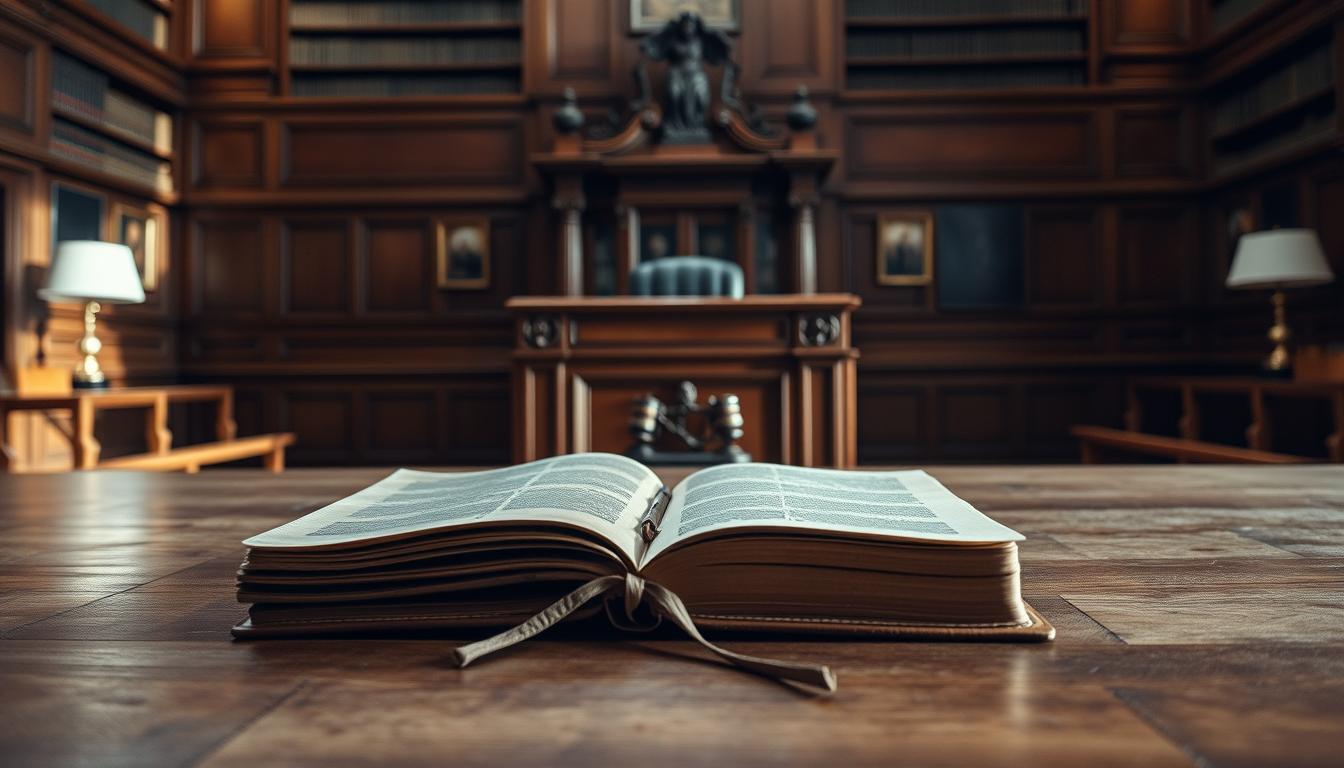Your private diary thoughts could become public in a courtroom. Personal writing and legal proceedings often intersect in complex ways. Your diary might turn into a key piece of court evidence.
It’s vital to know how diaries can affect legal cases. Courts generally protect privacy, but sometimes allow diary entries as evidence. The focus is on relevance, authenticity, and how the diary was found.
Diary evidence can help or hurt your case in court. Lawyers examine diary contents carefully. They look for entries that could explain a legal situation.
This guide explores how personal writings mix with legal matters. We’ll discuss when courts might use your diary. We’ll also cover existing protections and smart ways to document experiences.
Knowing about court evidence helps you write more carefully. It’s useful whether you’re facing legal issues or just curious. Understanding these rules is your best defense.
Understanding the Role of Diaries in Legal Context
Personal writings can significantly impact court cases and legal issues. It’s crucial to understand how the legal system treats diaries. This knowledge is vital for anyone who keeps a written record of their experiences.
Diaries have become potential sources of critical information in legal proceedings. These personal documents can carry substantial weight in writing safety and documentation. Their importance has grown throughout history.
What Constitutes Legal Evidence?
Legal evidence encompasses several key characteristics:
- Relevance to the specific case
- Obtained through legal means
- Authenticated by credible sources
- Free from significant bias
“A contemporaneous record can often speak louder than retrospective testimony.” – Legal Professional
How Are Diaries Treated Legally?
Courts evaluate diaries based on specific criteria that determine their admissibility. The following considerations are critical:
| Evaluation Criteria | Legal Significance |
|---|---|
| Contemporaneous Writing | High credibility due to immediate documentation |
| Accuracy of Details | Precise and objective observations preferred |
| Professional Context | Work-related diaries carry more weight |
| Personal Bias | Subjective comments may reduce reliability |
Your diary can be a powerful tool in legal proceedings. However, it must meet strict evidentiary standards. Understanding these nuances can help you maintain a legally sound document.
Types of Diaries and Their Implications
Personal documentation offers fascinating insights into journal privacy and private writing. Diaries come in many forms, each with unique traits and potential legal implications. Your choice of diary can greatly impact your journaling experience.
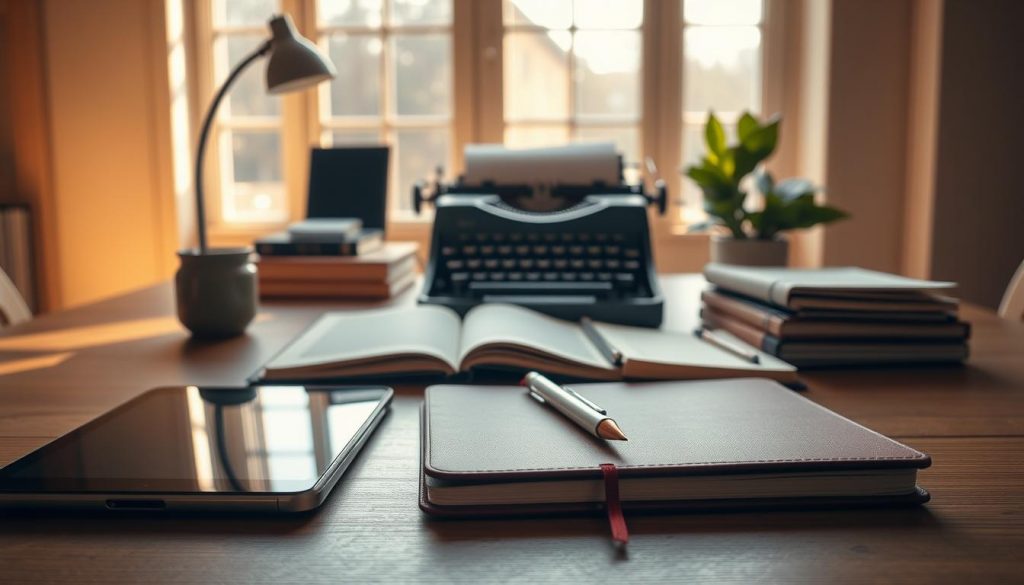
Diary keeping has changed dramatically since the first online diary in 1994. Today, you have several options for recording your personal experiences. These include traditional handwritten journals, digital diary apps, and cloud-based platforms.
- Traditional handwritten journals
- Digital diary applications
- Password-protected digital notebooks
- Cloud-based journaling platforms
Personal Journals: Private Reflections
Personal journals are intimate spaces for self-expression. These private writings often include daily emotional experiences and confidential observations. They serve as a safe place for your innermost thoughts.
- Daily emotional experiences
- Personal thoughts and reflections
- Confidential observations
Digital Diaries: Modern Journaling Landscape
Digital diaries have transformed journaling privacy with advanced security features. Mobile apps now offer 256-bit AES encryption to protect your personal thoughts. This ensures your entries remain private and secure.
| Diary Type | Privacy Level | Security Features |
|---|---|---|
| Paper Journal | Physical security | Lock and key |
| Digital App | High encryption | Password, biometric |
| Cloud Platform | Remote protection | Multi-factor authentication |
“Your diary is a sanctuary of personal thoughts, deserving the highest level of privacy and protection.”
Knowing the differences between diary formats helps you choose wisely. You can document your experiences while maintaining strong journal privacy. Your diary choice impacts how you preserve and protect your personal thoughts.
The Admissibility of Your Diary as Evidence
Your diary could become crucial evidence in legal proceedings. Courts have specific rules about using diaries as evidence. The process involves hearsay rules and authenticating diary entries.
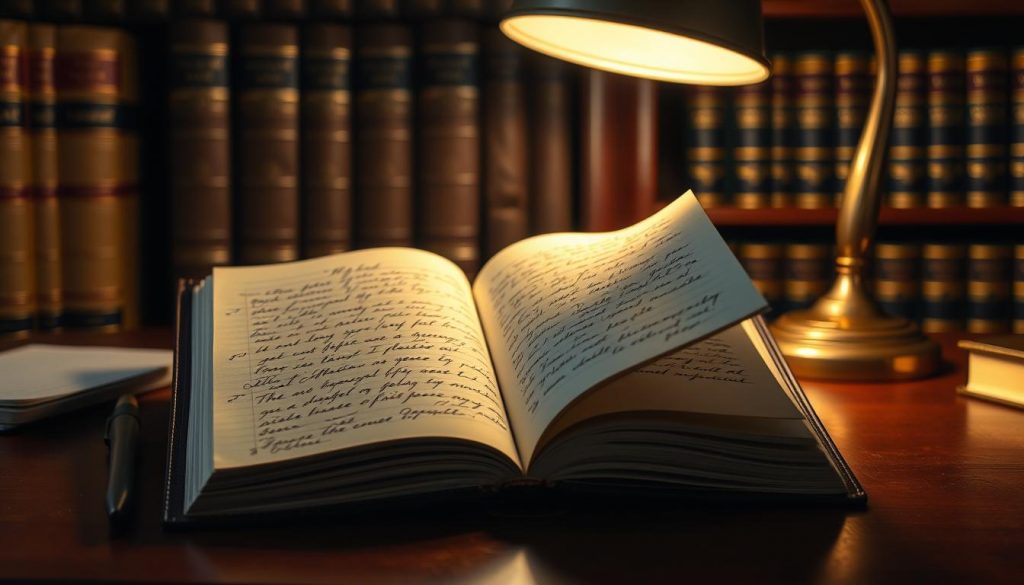
Decoding Hearsay Rules
Diary as evidence often falls into the complex hearsay category. However, exceptions can make your diary potentially admissible. These include statements made during an event and entries showing state of mind.
- Statements made contemporaneously with an event
- Entries showing state of mind
- Records made during a business or professional activity
Authentication of Diary Entries
For your diary to be considered legitimate court evidence, it must be properly authenticated. This means proving the diary’s ownership and the entries’ authenticity.
“The credibility of a document is as important as its content in legal proceedings.” – Legal Expert
Authentication methods include handwriting analysis for physical journals and digital forensics for electronic diaries. Witness testimony confirming the diary’s origin can also be used.
- Handwriting analysis for physical journals
- Digital forensics for electronic diaries
- Witness testimony confirming the diary’s origin
Knowing these legal FAQs can help you prepare for situations where your writings might become evidence. Understanding the rules can make a significant difference in legal proceedings.
Important Considerations for Diary Use in Court
Personal journals can be critical evidence in legal proceedings. Your diary might seem private, but it could impact court cases. Understanding privacy concerns and risks is crucial when writing in your journal.
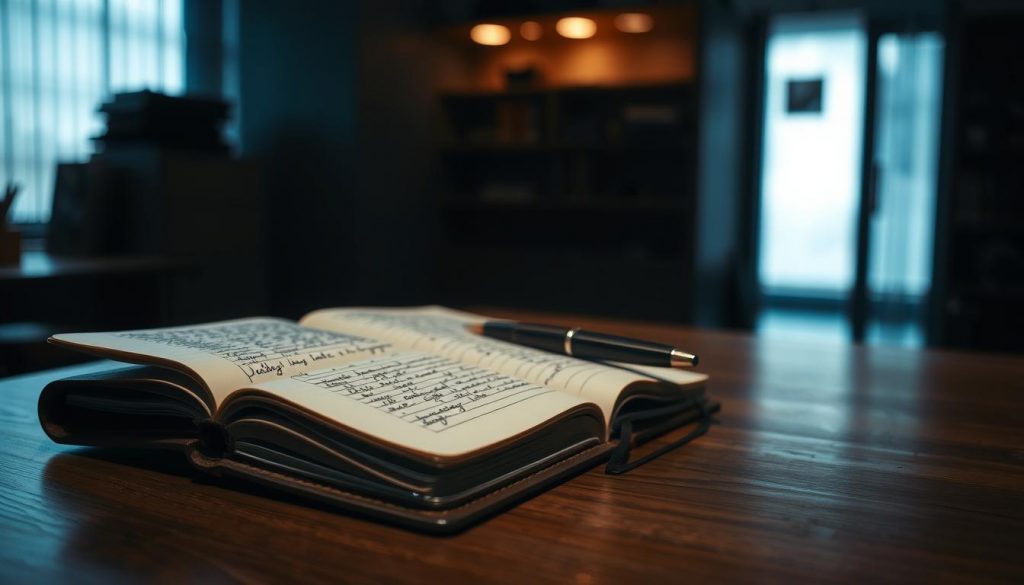
Several key factors can affect how courts view your personal writings. Be aware of these when considering writing safety and legal implications.
Privacy Protections in Personal Journals
Courts recognize the sensitive nature of private writings. They typically implement safeguards to prevent unnecessary disclosure. Legal restrictions limit invasive examination of personal diary content.
Irrelevant or highly sensitive information can be protected. The context of diary entries plays a crucial role in legal interpretation.
- Legal restrictions limit invasive examination of personal diary content
- Irrelevant or highly sensitive information can be protected
- Context of diary entries plays a crucial role in legal interpretation
Understanding Potential Bias in Diary Entries
Judges and lawyers carefully evaluate the credibility of diary evidence. They know personal writings can reflect subjective experiences and emotional biases. These factors are considered when assessing diary entries in court.
| Bias Factors | Legal Consideration |
|---|---|
| Emotional State | Assessed for potential distortion of events |
| Personal Motivation | Examined for potential agenda or perspective |
| Writing Context | Analyzed for understanding true intent |
“Your diary is a personal narrative, but in legal settings, it becomes a potential piece of evidence that requires careful scrutiny.” – Legal Expert
Knowing these factors helps you make informed decisions about documenting personal experiences. You can maintain writing safety while addressing privacy concerns. Consider the potential legal implications when writing in your journal.
How to Properly Document Events in Your Diary
A reliable diary needs careful attention to detail and commitment to writing safety. Your journal can be a powerful tool for documenting experiences. To achieve this, approach journaling with strategic precision.
Your personal diary can safeguard important memories and events. It may also serve as valuable documentation in the future.
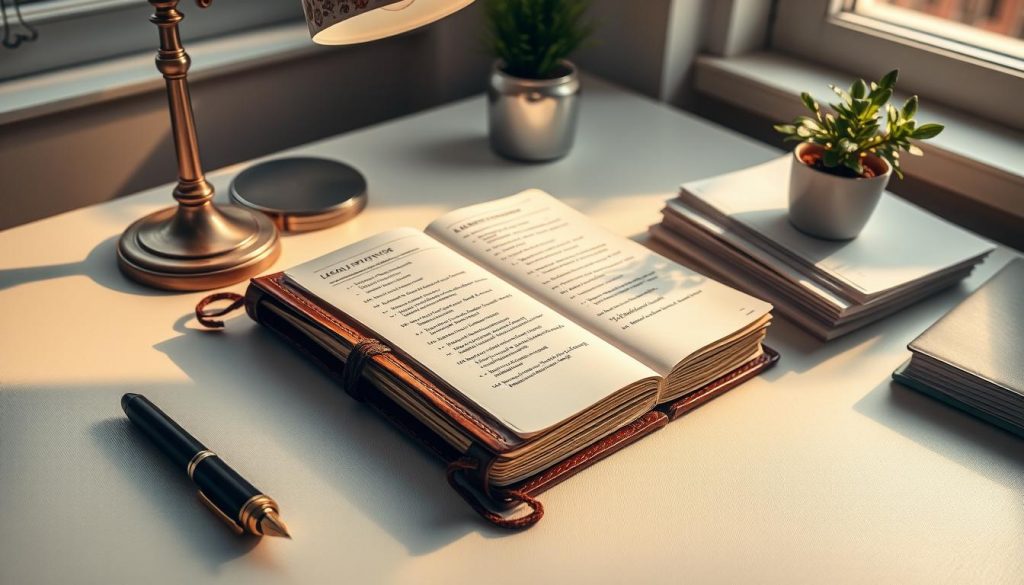
A credible diary is more than just recording thoughts. Your entries should be thoughtful, accurate, and consistent. This approach can make your diary a valuable resource.
Tips for Accurate and Timely Entries
- Write entries as soon as possible after events occur
- Use specific dates and times for each entry
- Be objective and factual
- Avoid emotional language or speculation
- Maintain regular writing habits
What to Include and Exclude in Your Diary
Understand the boundaries of documentation when practicing private writing. Focus on verifiable information in your entries. Avoid including potentially damaging personal commentary.
| Include | Exclude |
|---|---|
| Dates and times of events | Rumors or hearsay |
| Factual observations | Personal opinions about individuals |
| Direct quotes | Speculative statements |
| Specific details | Sensitive personal information |
“A well-maintained diary is a powerful tool of personal documentation when approached with care and professionalism.”
Your goal is to create a reliable record for potential legal purposes. Write with clarity, consistency, and respect for future review. This approach will help protect your journaling privacy.
The Impact of Diary Evidence on Your Case
Diary evidence can be a powerful tool in court. It’s important to understand its potential risks and benefits. Your diary could significantly influence your case’s outcome.
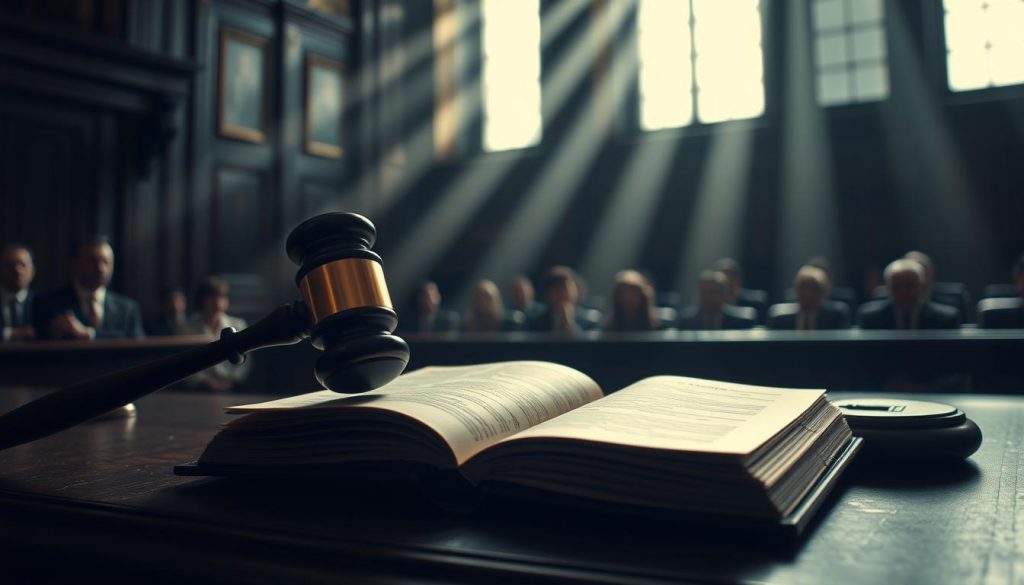
Recent studies show interesting trends in diary admissibility. About 20% of court cases now accept diaries as evidence. This is up from 15% in 2018.
- Approximately 20% of court cases admit diaries as evidence
- Diary admissibility has increased from 15% in 2018 to 20% in 2020
- Consistent diary entries can enhance legal credibility
Can Your Diary Strengthen Your Argument?
Diaries can boost your legal position when used strategically. Pain diaries provide detailed records for personal injury claims. Claimants with good documentation are 30% more likely to get favorable settlements.
“A well-maintained diary is like a time capsule of truth in legal proceedings.”
Potential Risks of Using Your Diary in Court
Diaries can be powerful, but they’re not without risks. Emotional entries might weaken your case. Opposing lawyers could find contradictions in your words.
Inconsistent documentation could harm your argument. Every word might be scrutinized by the other side.
- Objectivity of entries
- Consistency of documentation
- Relevance to legal issues
- Potential bias in personal accounts
Understanding these factors is crucial. It helps you decide if your diary should be legal evidence. Make informed choices about presenting your diary in court.
How to Obtain Legal Representation for Diary Issues
Legal challenges with personal diaries need smart guidance. Protecting your rights and diary’s integrity requires knowing when to seek legal help.
Diary-related legal matters can be tricky, especially in court. Getting an attorney at the right time can greatly impact your case.
When to Consult an Attorney
You should consider legal counsel in the following scenarios:
- Receiving a subpoena for your diary
- Anticipating your diary might be used as court evidence
- Experiencing potential privacy violations
- Facing legal disputes involving personal documentation
Finding the Right Lawyer for Your Needs
Choose a lawyer who knows about personal documentation laws. Look for experts in handling private writing cases.
| Lawyer Qualification | Importance |
|---|---|
| Family Law Experience | High |
| Privacy Rights Knowledge | Critical |
| Documentation Evidence Expertise | Essential |
“Protecting your personal narrative requires skilled legal guidance.” – Legal Privacy Expert
About 80% of personal documentation cases benefit from specialized legal help. Your lawyer choice can greatly affect your legal outcome.
Preparing for Your Initial Consultation
- Gather all relevant diary documentation
- Prepare a chronological summary of events
- List specific concerns about potential legal challenges
- Bring any existing legal correspondence
Proactive legal representation can help safeguard your personal writings and protect your rights in complex legal situations.
Case Studies: Diaries in Real Legal Scenarios
Personal diaries have played fascinating roles in court cases throughout history. These private writings often become critical evidence with significant legal implications. From landmark battles to intimate disputes, diaries can shape legal outcomes.
To understand how diaries function as evidence, we must examine real-world scenarios. These cases show how personal writings can dramatically influence legal decisions.
Landmark Cases Involving Diary Evidence
Several high-profile cases demonstrate the powerful impact of diaries in courtrooms:
- The Anne Frank Diary Authentication case, which involved extensive forensic analysis
- Divorce proceedings where personal diary entries revealed critical relationship dynamics
- Criminal investigations using diary documentation as circumstantial evidence
Legal Insights from Court Cases
Courts carefully evaluate diary entries, considering several key factors:
| Evaluation Criteria | Legal Consideration |
|---|---|
| Authenticity | Verifying the diary’s genuine origin |
| Relevance | Determining direct connection to legal matter |
| Hearsay Limitations | Assessing potential inadmissibility |
“A diary is not just ink on paper, but a potential window into truth.” – Legal Experts
Your personal writings can greatly impact legal proceedings. Knowing these details helps protect your privacy. It also shows how courts might use your diary as evidence.
Conclusion: Should You Keep a Diary?
Keeping a personal diary requires careful thought about privacy. It’s a great tool for self-reflection, but legal issues may arise. Experts suggest writing with caution, especially when privacy could intersect with legal matters.
Consider creating separate journals for sensitive information. Use general language and avoid specific details that could compromise your privacy. Record observations objectively without including potentially damaging statements.
Digital diary platforms offer extra protection through encryption and passwords. Your choice of recording method can greatly impact journal privacy. Technology provides new ways to safeguard personal writing while maintaining journaling benefits.
Keeping a diary is a personal choice. By understanding legal implications and using smart strategies, you can enjoy personal record-keeping. Stay informed about your rights and use journaling for personal growth.
Weighing the Pros and Cons
Each diary entry could have legal implications. Most personal journals stay private, but future scrutiny is possible. Writing thoughtfully can help protect you. A legal professional can offer guidance for your specific situation.
Final Thoughts on Diary Legal Evidence
Your personal story is important. Write wisely to protect your privacy while enjoying self-documentation. Remember, your diary reflects your experiences, not potential legal problems.
FAQ
Can my personal diary be used as evidence in court?
Yes, your diary can be used as evidence in court. Its admissibility depends on relevance, authentication, and legal rules. Courts may consider diary entries in both civil and criminal cases.
How do courts determine if my diary is admissible as evidence?
Courts evaluate diary evidence based on authenticity, relevance, and hearsay rules. The diary’s acquisition method, consistency, and entry context are crucial factors. These elements help determine if it can be admitted as legitimate evidence.
Are digital diaries treated differently from handwritten journals in legal settings?
Digital diaries face unique challenges in legal proceedings. They require additional authentication methods like digital forensics and metadata analysis. Electronic journals may be more vulnerable to tampering. Courts scrutinize their integrity more closely than traditional handwritten diaries.
Can I protect my privacy if my diary becomes legal evidence?
You have some protections against complete disclosure. Courts usually allow redaction of irrelevant or overly personal information. Work with your attorney to limit the scope of diary entries introduced as evidence.
What should I do if I receive a subpoena for my diary?
Consult with a legal professional immediately. Don’t alter or destroy the diary, as this could be obstruction. An experienced attorney can help you understand your rights and assess potential impacts.
How can I write a diary that might be useful as potential evidence?
Focus on factual, objective documentation. Write entries promptly after events occur. Be specific and clear, avoiding emotional language or speculation. Use dates, times, and specific details.
Consider keeping a separate, more formal record if you anticipate potential legal relevance.
Are there any circumstances where my diary cannot be used in court?
There are limitations on using diaries as evidence. Entries that are entirely hearsay or irrelevant may be excluded. Some jurisdictions have specific privacy protections that can limit personal writings’ use.
What risks should I consider before using my diary as evidence?
Introducing your diary as evidence allows opposing counsel to examine the entire document. This might reveal information that could harm your case or contradict your claims. Carefully consider the full content before using it as evidence.
Source Links
- Can a Diary be Used as Evidence? Are Diaries Admissible in Court?
- Privacy vs. Discovery: Legal Strategies for Diary Protection
- The Importance of Keeping a Diary
- The Role of the Diary – Life Stories Diary
- Diary
- History of reading tutorial 1: Finding evidence of reading in the past
- Diaries as historical sources – Unique and Distinctive
- Wilson Criminal Defence – Calgary Criminal Lawyer
- Understanding Some Basics About Hearsay Evidence
- self-incrimination
- How to Win Your Court Case by Following 5 Simple Principles — AUBRY CAMPBELL MACLEAN
- Why eyewitnesses fail – PMC
- Microsoft Word – Chapter 09 Final.doc
- A Notary’s guide to completing journal entries
- Best Evidence for Child Custody Cases (And How to Organize)
- The Role Of A Pain Diary In A Personal Injury Case
- Diary as Evidence: Legal Use in Court Cases
- Your Diary Privacy | Family Law Resources | Z Family Law
- Documentation in Child Custody Cases
- v24n4
- The authenticity of the diary of Anne Frank
- Labeling Documents as Protected from Disclosure: Why Bother? – Boston Bar Association
- A Primer on Keeping and Maintaining a Good Daily Diary

